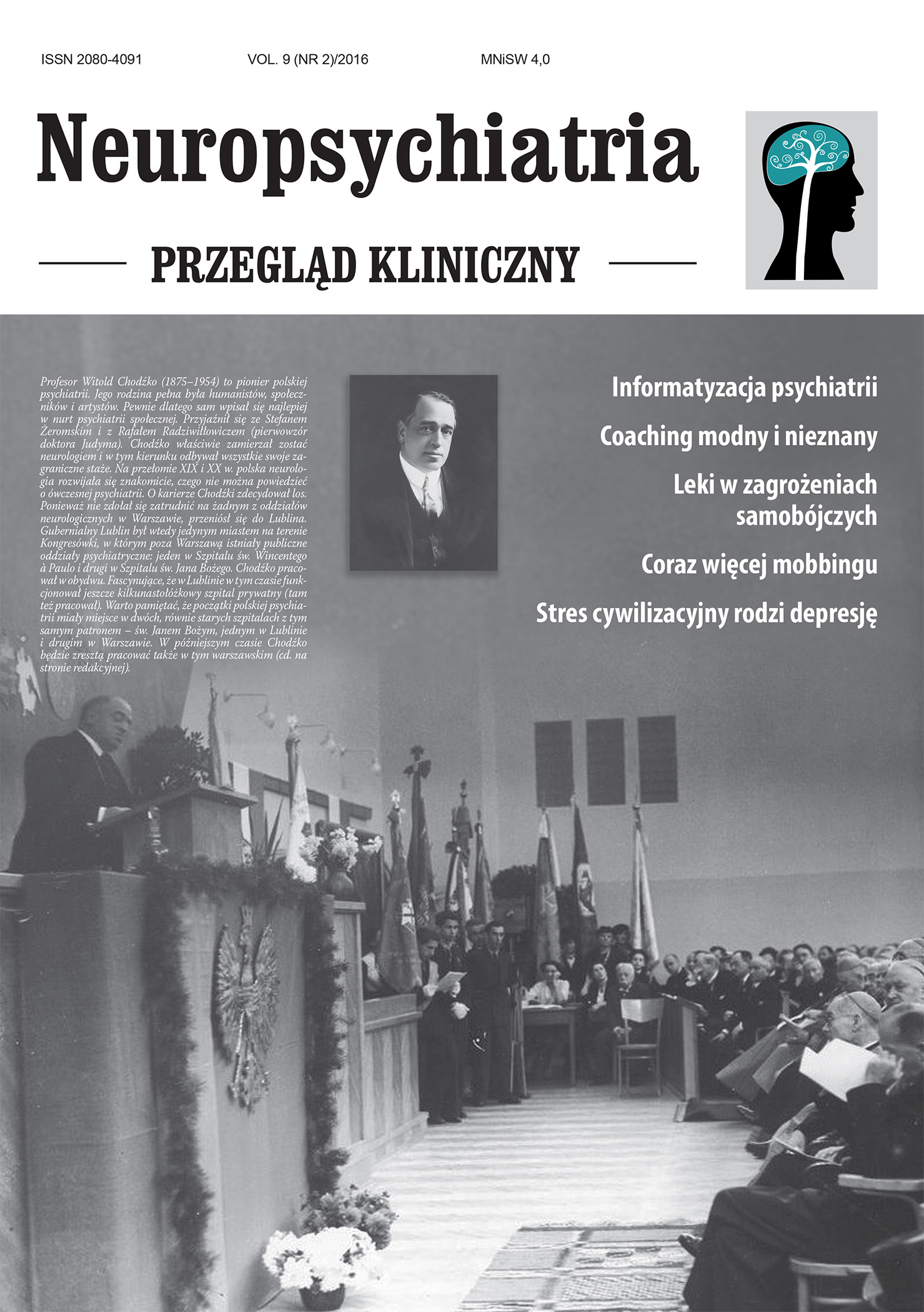Nowe formy cywilizacyjnej depresji i ich farmakologiczne leczenie Artykuł przeglądowy
##plugins.themes.bootstrap3.article.main##
Abstrakt
Wielu ludzi może doświadczać stosunkowo mało nasilonych lub prodromalnych objawów depresji, które jednak faktycznie głęboko wpływają na ich zdrowie psychiczne. Doświadczenie uogólnionego braku satysfakcji może oznaczać coś zupełnie innego niż tylko proste poczucie braku szczęścia. Subkliniczna depresja, maskowana depresja lub inne formy obniżonego nastroju mogą być powiązane z problemami psychospołecznymi, takimi jak: pracoholizm, wypalenie, zespół przewlekłego zmęczenia, mobbing, bullying czy ideacje samobójcze. Stany te mogą być równie dramatyczne i ciężkie, jak w pełni rozwinięta depresja. Dysponujemy głównie wstępnymi wynikami badań farmakologicznych, wykorzystujących zwłaszcza leki typu SSRI, np. escitalopram, w większości tych wskazań.
##plugins.themes.bootstrap3.article.details##

Utwór dostępny jest na licencji Creative Commons Uznanie autorstwa – Użycie niekomercyjne – Bez utworów zależnych 4.0 Międzynarodowe.
Copyright: © Medical Education sp. z o.o. License allowing third parties to copy and redistribute the material in any medium or format and to remix, transform, and build upon the material, provided the original work is properly cited and states its license.
Address reprint requests to: Medical Education, Marcin Kuźma (marcin.kuzma@mededu.pl)
Bibliografia
2. Sussman S. Workaholism: A Review. J Addict Res Ther 2012; suppl 6(1).
3. OECD. Temporary employment. 01.07.2016.
4. Aholaa K, Hakanena J, Perhoniemia R, Mutanenb P. Relationship between burnout and depressive symptoms: A study using the person-centred approach. Burnout Research 2014; 1(1): 29-37.
5. Bianchi R, Schonfeld IS, Laurent E. Is burnout a depressive disorder? A reexamination with special focus on atypical depression. Int J Stress Manag 2014; 21(4): 307-324.
6. Madsen IE, Lange T, Borritz M, Rugulies R. Burnout as a risk factor for antidepressant treatment – a repeated measures time-to-event analysis of 2936 Danish human service workers. J Psychiatr Res 2015; 65: 47-52.
7. Amsterdam JD, Shults J, Rutherford N. Open-label study of s-citalopram therapy of chronic fatigue syndrome and co-morbid major depressive disorder. Prog Neuropsychopharmacol Biol Psychiatry 2008; 32(1): 100-106.
8. Leymann H. Mobbing and psychological terror at workplaces. Violence Vict 1990; 5(2): 119-126.
9. Signorelli MS, Costanzo MC, Cinconze M, Concerto C. What kind of diagnosis in a case of mobbing: post-traumatic stress disorder or adjustment disorder? BMJ Case Rep 2013; 2013.
10. Fiabane E, Flachi D, Giorgi I et al. Professional outcomes and psychological health after workplace bullying: an exploratory follow-up study. Med Lav 2015; 106(4): 271-283.
11. Ballard ED, Ionescu DF, Vande Voort JL et al. Improvement in suicidal ideation after ketamine infusion: relationship to reductions in depression and anxiety. J Psychiatr Res 2014; 58: 161-166.
12. Łoza B. Psychofarmakologiczna redukcja zagrożeń samobójczych. Neuropsychiatria. Przegląd Kliniczny 2016; 8(2).

